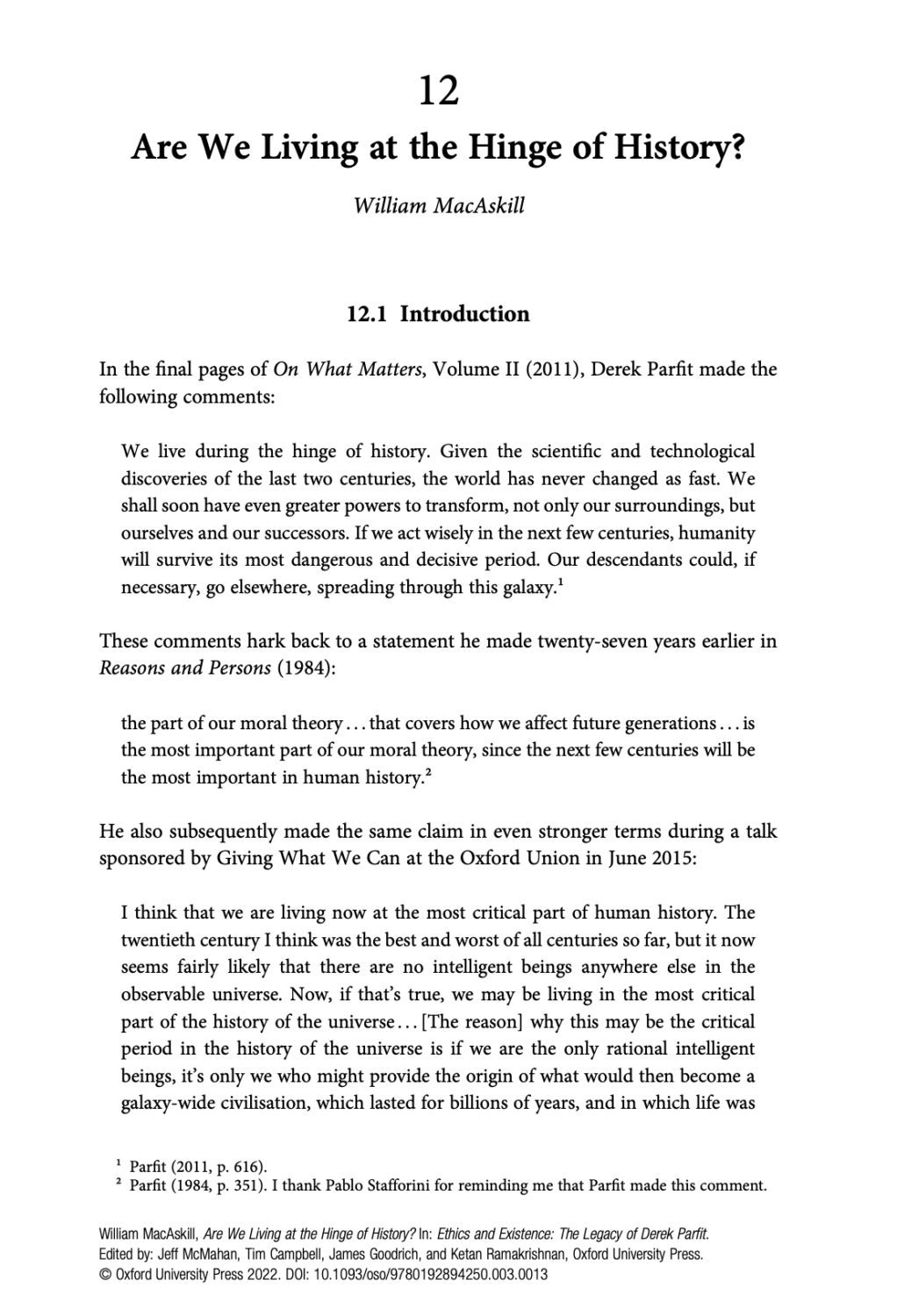Are we living at the hinge of history?
William MacAskill (Global Priorities Institute, Oxford University)
GPI Working Paper No. 12-2020, published in Ethics and Existence: The Legacy of Derek Parfit
In the final pages of On What Matters, Volume II, Derek Parfit comments: ‘We live during the hinge of history... If we act wisely in the next few centuries, humanity will survive its most dangerous and decisive period... What now matters most is that we avoid ending human history.’ This passage echoes Parfit's comment, in Reasons and Persons, that ‘the next few centuries will be the most important in human history’.
But is the claim that we live at the hinge of history true? The argument of this paper is that it is not. The paper first suggests a way of making the hinge of history claim precise and action-relevant in the context of the question of whether altruists should try to do good now, or invest their resources in order to have more of an impact later on. Given this understanding, there are two worldviews - the Time of Perils and Value Lock-in views - on which we are indeed living during, or about to enter, the hinge of history.
This paper then presents two arguments against the hinge of history claim: first, that it is a priori extremely unlikely to be true, and that the evidence in its favour is not strong enough to overcome this a priori unlikelihood; second, an inductive argument that our ability to influence events has been increasing over time, and we should expect that trend to continue into the future. The paper concludes by considering two additional arguments in favour of the claim, and suggests that though they have some merit, they are not sufficient for us to think that the present time is the most important time in the history of civilisation.
Other working papers
Strong longtermism and the challenge from anti-aggregative moral views – Karri Heikkinen (University College London)
Greaves and MacAskill (2019) argue for strong longtermism, according to which, in a wide class of decision situations, the option that is ex ante best, and the one we ex ante ought to choose, is the option that makes the very long-run future go best. One important aspect of their argument is the claim that strong longtermism is compatible with a wide range of ethical assumptions, including plausible non-consequentialist views. In this essay, I challenge this claim…
Against Anti-Fanaticism – Christian Tarsney (Population Wellbeing Initiative, University of Texas at Austin)
Should you be willing to forego any sure good for a tiny probability of a vastly greater good? Fanatics say you should, anti-fanatics say you should not. Anti-fanaticism has great intuitive appeal. But, I argue, these intuitions are untenable, because satisfying them in their full generality is incompatible with three very plausible principles: acyclicity, a minimal dominance principle, and the principle that any outcome can be made better or worse. This argument against anti-fanaticism can be…
Altruism in governance: Insights from randomized training – Sultan Mehmood, (New Economic School), Shaheen Naseer (Lahore School of Economics) and Daniel L. Chen (Toulouse School of Economics)
Randomizing different schools of thought in training altruism finds that training junior deputy ministers in the utility of empathy renders at least a 0.4 standard deviation increase in altruism. Treated ministers increased their perspective-taking: blood donations doubled, but only when blood banks requested their exact blood type. Perspective-taking in strategic dilemmas improved. Field measures such as orphanage visits and volunteering in impoverished schools also increased, as did their test scores in teamwork assessments…

